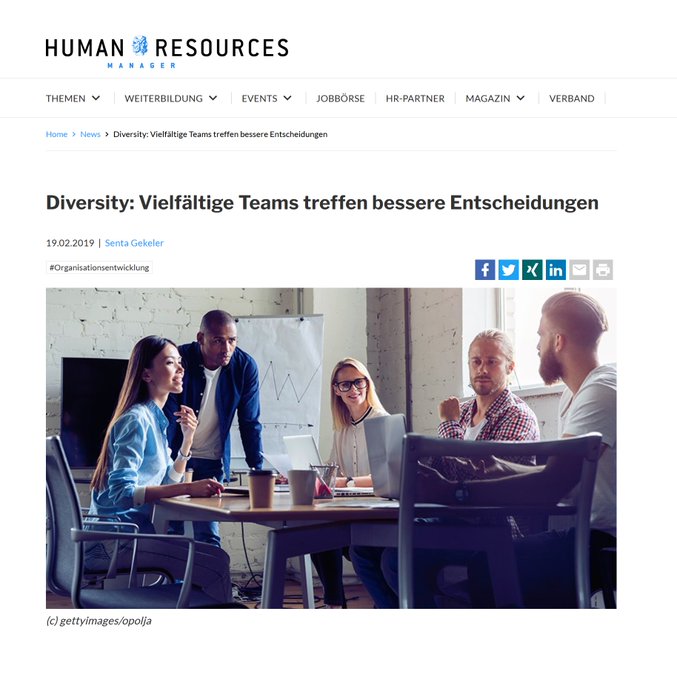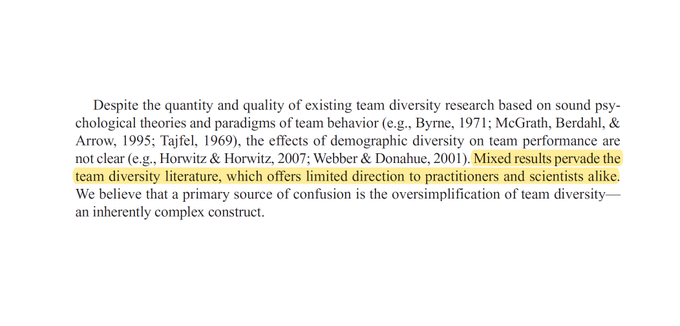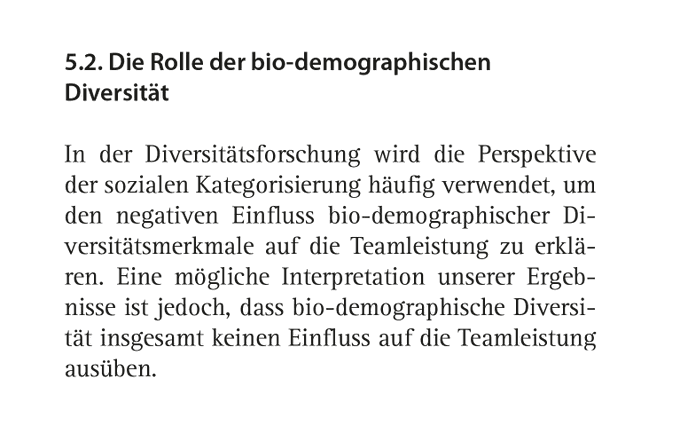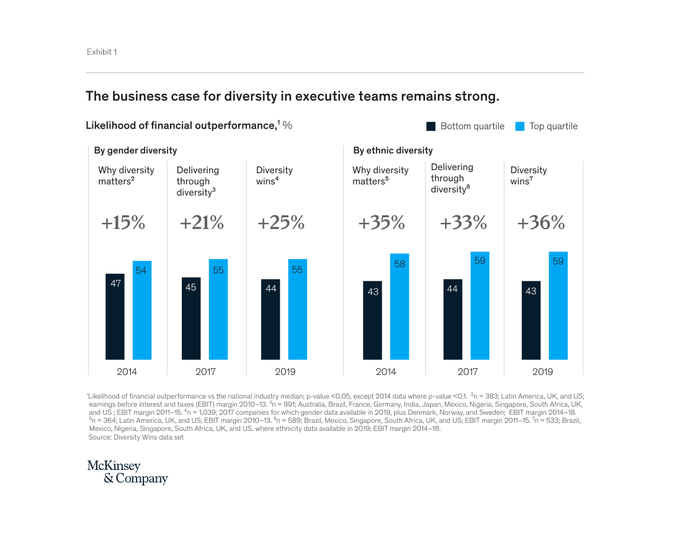Titat Scriptor hat einen interessanten Thread zu Studien über die Wirkung von Diversity:
Es kam eine Anfrage: ob ich in einem lokalen Diversity-Gremium mitwirken wolle? Weil dazu gute Kenntnisse der Materie sinnvoll sind, habe ich in die Forschung geschaut: Was haben Unternehmen von Diversity? Ich muss sagen, das lief überhaupt nicht wie erwartet. Hier die Daten |1
4| Besser wird es erst, wenn man (wie im Zitat gefordert) Diversity in einzelne Aspekte aufteilt und separat betrachtet, z.B. so: 1. biodemografisch (Geschlecht, Ethnie, Alter) 2. persönlich (Persönlichkeit, Werte, Einstellungen) 3. fachlich (Berufserfahrung, Ausbildung)5| „Biodemografische“ Vielfalt ist, was sich die meisten Leute landläufig unter Diversity vorstellen dürften: nach Geschlecht, Herkunft oder Generation bunt gemischte Teams. Dieser Diversity-Begriff steht auch im Fokus, wo (repräsentative) Vielfalt per Quote vorgeschlagen wird.6| Der öffentlichen Wahrnehmung zum Trotz bringt diese Art von Diversity für die Teamperformance offenbar praktisch nichts. Meta-Studien finden entweder gar keinen Zusammenhang (Q3, Q4) oder systematische kleine, aber negative Effekte für die Qualität der Teamarbeit (Q2, Q5, Q6).7| Einzig Q7 ergibt positive Einflüsse auf Kreativität und Zufriedenheit, die aber durch andere negative Folgen (z.B. Teamkonflikte) wieder kaputtgemacht werden. Insgesamt scheint dieses Zitat die wohlwollendste Deutung der Lage zu bieten (Q4). Kein schlagendes Verkaufsargument.
8| Nicht viel besser sieht es bei Nr. 2 aus: Vielfalt bei Persönlichkeit, Werten und Einstellungen. Q8 ergibt, dass Vielfalt dieser Art systematisch mehr Konflikte generiert und Prozesse erschwert (ähnlich auch Q7), besonders bei komplexen Aufgaben und in Teams im Topmanagement.
12| Auch Diversity auf Teamebene bleibt im Rennen. Die Studien zeigen, dass sich Effekte teils nach Branche, Kultur und Aufgabe unterscheiden (Q9). Implikation: Verantwortliche sollten gut prüfen, was in ihrem Kontext funktioniert. Vgl. z.B. Q12 für den medizinischen Bereich.
Hier die Studien noch einmal als Abstracts:
The authors revisited the demographic diversity variable and team performance relationship using meta-analysis and took a significant departure from previous meta-analyses by focusing on specific demographic variables (e.g., functional background, organizational tenure) rather than broad categories (e.g., highly job related, less job related). They integrated different conceptualizations of diversity (i.e., separation, variety, disparity) into the development of their rationale and hypotheses for specific demographic diversity variable—team performance relationships. Furthermore, they contrasted diversity with the team mean on continuous demographic variables when elevated levels of a variable, as opposed to differences, were more logically related to team performance. Functional background variety diversity had a small positive relationship with general team performance as well as with team creativity and innovation. The relationship was strongest for design and product development teams. Educational background variety diversity was related to team creativity and innovation and to team performance for top management teams. Other variables generally thought to increase task-relevant knowledge (e.g., organizational tenure) and team performance were unrelated to team performance, although these variables were almost never studied as the variety conceptualization (i.e., the conceptualization that can reflect the breadth of knowledge that can be applied to the task). Team mean organizational tenure was related to team performance in terms of efficiency. Race and sex variety diversity had small negative relationships with team performance, whereas age diversity was unrelated to team performance regardless of diversity conceptualization. Implications for staffing teams and future research are discussed.
A meta-analysis of the data from empirical investigations of diversity in work groups was used to examine the impact of two types of diversity attributes, highly job-related and less job-related, on work group cohesion and performance. This distinction was used to test the proposition that different types of diversity will differentially impact work group cohesion and performance. In addition, type of team was examined as a possible moderator of the relationship between diversity and performance. Results showed that neither type of diversity had a relationship with cohesion or performance. Explanations and directions for future research are offered.
This study attempts to open the black box of top management team (TMT) diversity research by examining the following research questions: (a) how TMT diversity has effects on emergent team processes, (b) when those effects are shaped by key environmental contingencies, and (c) whether emergent team processes mediate the TMT diversity and firm performance relationship. To address these issues, we conduct a series of meta-analytic examination. First, using a sample of 208 effect sizes from 51 studies covering multiple industries across 10 countries, we test how two distinct types of diversity (task- and relations-oriented diversity) are differentially associated with two types of emergent team processes (information elaboration and social categorization) in TMTs. Second, meta-analytic regression analyses are conducted to examine how national culture (power distance and collectivism) and industry characteristics (munificence and dynamism) influence the diversity effects on emergent team processes. Third, we conduct a structural equation modeling analysis to examine the relationships among diversity (input)–information elaboration and social categorization–based processes (mediators)–firm performance (output), incorporating additional 895 effect sizes from 152 studies. Our findings indicate that while relations-oriented diversity has apparent relationships with social categorization–based processes, task-oriented diversity is strongly associated with both information elaboration and social categorization–based processes. Industry munificence and dynamism as well as collectivism in national culture moderate the diversity–social categorization relationships. The result of structural equation modeling also confirms the mediating paths of the TMT diversity–information elaboration/social categorization–performance links.
The impact of gender diversity on team performance has become a central topic in the field of human resource management for researchers and practitioners alike. Extant research provides conflicting evidence on the relationship between gender diversity and team performance. To resolve these contradictory findings, we meta-analyze the relationship between gender diversity and two performance outcomes, namely task performance and contextual performance. Grounded in categorization-elaboration model, we simultaneously consider the positive and negative aspects of gender diversity. We further examine the effect of cultural context as a moderator on the relationship between gender diversity and team performance. Based on 71 independent samples from 68 studies published between 1996 and 2013, we find a significant negative relationship ( − 0.10) between gender diversity and contextual performance. Additionally, we find that the cultural dimensions gender egalitarianism and collectivism have significant moderating influences on the relationship between gender diversity and task performance.
Previous research on the role of cultural diversity in teams is equivocal, suggesting that cultural diversity’s effect on teams is mediated by specific team processes, and moderated by contextual variables. To reconcile conflicting perspectives and past results, we propose that cultural diversity affects teams through process losses and gains associated with increased divergence and decreased convergence. We examine whether the level (surface-level vs deep-level) and type (cross-national vs intra-national) of cultural diversity affect these processes differently. We hypothesize that task complexity and structural aspects of the team, such as team size, team tenure, and team dispersion, moderate the effects of cultural diversity on teams. We test the hypotheses with a meta-analysis of 108 empirical studies on processes and performance in 10,632 teams. Results suggest that cultural diversity leads to process losses through task conflict and decreased social integration, but to process gains through increased creativity and satisfaction. The effects are almost identical for both levels and types of cultural diversity. Moderator analyses reveal that the effects of cultural diversity vary, depending on contextual influences, as well as on research design and sample characteristics. We propose an agenda for future research, and identify implications for managers.
To reconcile the inconsistencies and complexities in the relationship between team diversity and performance, our meta-analysis takes a more nuanced approach to the relationship between team deep-level diversity and team performance. We examine the type of deep-level diversity (personality, values, culture), task complexity, and executive team status as moderators of the relationship between team deep-level diversity and positive emergent states, positive team processes, and team conflict. In addition, we examine the mediating role of positive team emergent states, positive team processes, and team conflict in explaining how team deep-level diversity relates to team performance. We test our hypotheses with a meta-analytic database of 94 papers reporting 280 effect sizes based on 24,425 teams. Findings show that team deep-level diversity is associated with fewer positive emergent states and positive team processes and more team conflict. There is an indirect relationship between team deep-level diversity and team performance through each of the mediators: positive emergent states, positive team processes, and team conflict. Implications for theory and practice are discussed.
Integrating macro and micro theoretical perspectives, we conducted a meta-analysis examining the role of contextual factors in team diversity research. Using data from 8,757 teams in 39 studies conducted in organizational settings, we examined whether contextual factors at multiple levels, including industry, occupation, and team, influenced the performance outcomes of relations-oriented and task-oriented diversity. The direct effects were very small yet significant, and after we accounted for industry, occupation, and team-level contextual moderators, they doubled or tripled in size. Further, occupation- and industry-level moderators explained significant variance in effect sizes across studies.
Over the past few decades, a great deal of research has been conducted to examine the complex relationship between team diversity and team outcomes. However, the impact of team diversity on team outcomes and moderating variables potentially affecting this relationship are still not fully answered with mixed findings in the literature. These research issues were, therefore, addressed by quantitatively reviewing extant work and provided estimates of the relationship between team diversity and team outcomes. In particular, the effects of task-related and bio-demographic diversity at the group-level were meta-analyzed to test the hypothesis of synergistic performance resulting from diverse employee teams. Support was found for the positive impact of task-related diversity on team performance although bio-demographic diversity was not significantly related to team performance. Similarly, no discernible effect of team diversity was found on social integration. The implications of the review for future research and practices are also discussed.
Background
Research on the effects of increasing workplace diversity has grown substantially. Unfortunately, little is focused on the healthcare industry, leaving organizations to make decisions based on conflicting findings regarding the association of diversity with quality and financial outcomes. To help improve the evidence-based research, this umbrella review summarizes diversity research specific to healthcare. We also look at studies focused on professional skills relevant to healthcare. The goal is to assess the association between diversity, innovation, patient health outcomes, and financial performance.
Methods
Medical and business research indices were searched for diversity studies published since 1999. Only meta-analyses and large-scale studies relating diversity to a financial or quality outcome were included. The research also had to include the healthcare industry or involve a related skill, such as innovation, communication and risk assessment.
Results
Most of the sixteen reviews matching inclusion criteria demonstrated positive associations between diversity, quality and financial performance. Healthcare studies showed patients generally fare better when care was provided by more diverse teams. Professional skills-focused studies generally find improvements to innovation, team communications and improved risk assessment. Financial performance also improved with increased diversity. A diversity-friendly environment was often identified as a key to avoiding frictions that come with change.
Conclusions
Diversity can help organizations improve both patient care quality and financial results. Return on investments in diversity can be maximized when guided deliberately by existing evidence. Future studies set in the healthcare industry, will help leaders better estimate diversity-related benefits in the context of improved health outcomes, productivity and revenue streams, as well as the most efficient paths to achieve these goals.
Research on the effects of increasing workplace diversity has grown substantially. Unfortunately, little is focused on the healthcare industry, leaving organizations to make decisions based on conflicting findings regarding the association of diversity with quality and financial outcomes. To help improve the evidence-based research, this umbrella review summarizes diversity research specific to healthcare. We also look at studies focused on professional skills relevant to healthcare. The goal is to assess the association between diversity, innovation, patient health outcomes, and financial performance.
Methods
Medical and business research indices were searched for diversity studies published since 1999. Only meta-analyses and large-scale studies relating diversity to a financial or quality outcome were included. The research also had to include the healthcare industry or involve a related skill, such as innovation, communication and risk assessment.
Results
Most of the sixteen reviews matching inclusion criteria demonstrated positive associations between diversity, quality and financial performance. Healthcare studies showed patients generally fare better when care was provided by more diverse teams. Professional skills-focused studies generally find improvements to innovation, team communications and improved risk assessment. Financial performance also improved with increased diversity. A diversity-friendly environment was often identified as a key to avoiding frictions that come with change.
Conclusions
Diversity can help organizations improve both patient care quality and financial results. Return on investments in diversity can be maximized when guided deliberately by existing evidence. Future studies set in the healthcare industry, will help leaders better estimate diversity-related benefits in the context of improved health outcomes, productivity and revenue streams, as well as the most efficient paths to achieve these goals.





